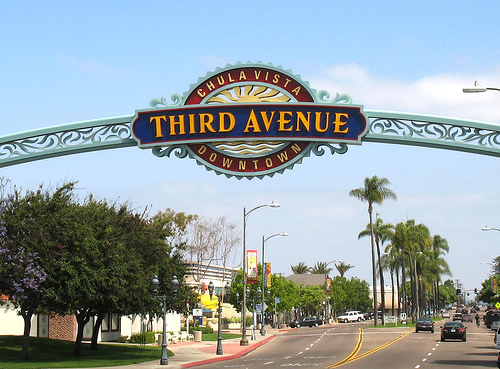By Maya Srikrishnan.
Chula Vista and Port of San Diego officials are hoping to entice developers with something rare in California: the promise of hassle-free waterfront development.
The vision for the 535 acres – more than 600 football fields – includes a convention center, hotels, apartments, office space and retail, with almost half of the property left as open space with trails for pedestrians and bikes. It also preserves and protects an environmentally sensitive area south of a nearby national wildlife refuge.
The master plan successfully passed a full environmental review in 2010. That means that when developers pursue projects in that area, they only need to prove their plans are consistent with that plan – a much easier process than doing their own environmental review.
“It’s already entitled,” said Gary Halbert, Chula Vista’s city manager, describing the city’s pitch to developers.
The space is one of the largest developable waterfront properties left on the West Coast.
The arrangement came together over 10 years ago because of an agreement between the Port, which regulates development along the San Diego Bay, the city of Chula Vista and private developer Pacifica Companies. Back then, the Port began negotiations to take ownership of over 100 acres of environmentally sensitive property near the Sweetwater Marsh National Wildlife Refuge that was owned by Pacifica.
Pacifica had previously put forth two proposals to develop the land that were shut down by environmental groups that thought the habitat was too sensitive for development. Former environmental activist Allison Rolfe – who had worked with the San Diego Audubon Society and San Diego Coast Keeper in opposition to the projects – approached Pacifica with an idea she had heard in planning school: a land swap.
Pacifica would hand over the environmentally sensitive land, and in exchange a public entity would hand the company land more suitable for development.
Pacifica latched on to the idea, and hired Rolfe to ensure it would happen. The Port signed on, too, offering up 35 acres of developable land on the waterfront, in exchange for the sensitive property it’s now preserving.
“The reason these things usually don’t happen is that developers usually have a property-rights attitude that they just want to do what they want on the land they own and government agencies aren’t willing to be creative to do something like a land swap,” Rolfe said. “This started out that way – battle lines being drawn. We were showing up at hearings and protesting, but then this land swap thing happened.”
The plan is now endorsed by the same environmental groups that once opposed it.
Chula Vista’s waterfront is one of the largest developable waterfront properties left on the West Coast.
The bayfront development plan was also approved by the Coastal Commission, which is usually an extra hurdle for oceanfront projects. The Coastal Commission is often viewed as tough on developers, and tends to favor buildings below 30 feet high – about three stories – along the coast. But it unanimously voted to make way for a 30-story hotel and for 11 residential towers on Pacifica’s 35 acres.
“The hardest part about building on the waterfront is getting it entitled,” Rolfe said. “If you get it entitled, you’re golden.”
But other developers weren’t as eager to join Pacifica on Chula Vista’s bayfront.
Despite the already entitled area, when the city put out a call for developers to build a 1,250-room hotel and a convention center, it received only one response, from Houston-based RIDA Development Corporation.
That one response “happened to be outstanding,” said Halbert. RIDA declined to comment on the project.
In addition to the RIDA hotel and convention center, Pacifica Companies also has 1,500 residential units, a 250-room hotel and some commercial and office space in the works on its property facing the waterfront. It plans to start construction in early 2017.
Halbert expects the two projects to catalyze interest in the area, drawing in other developers.
“We see these two as keystone projects on the bayfront,” he said. “We will get other developers.”
[divider] [/divider]





